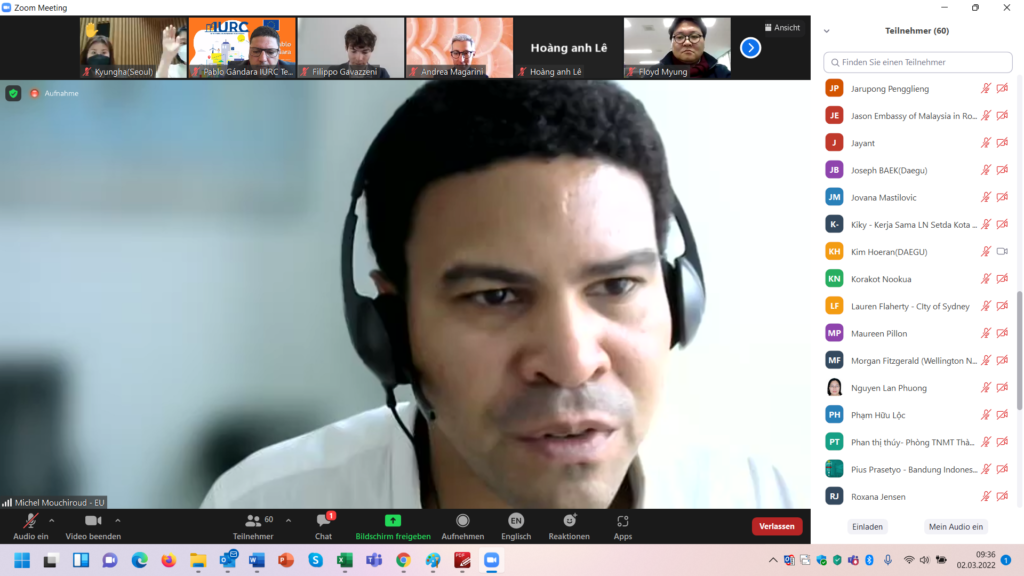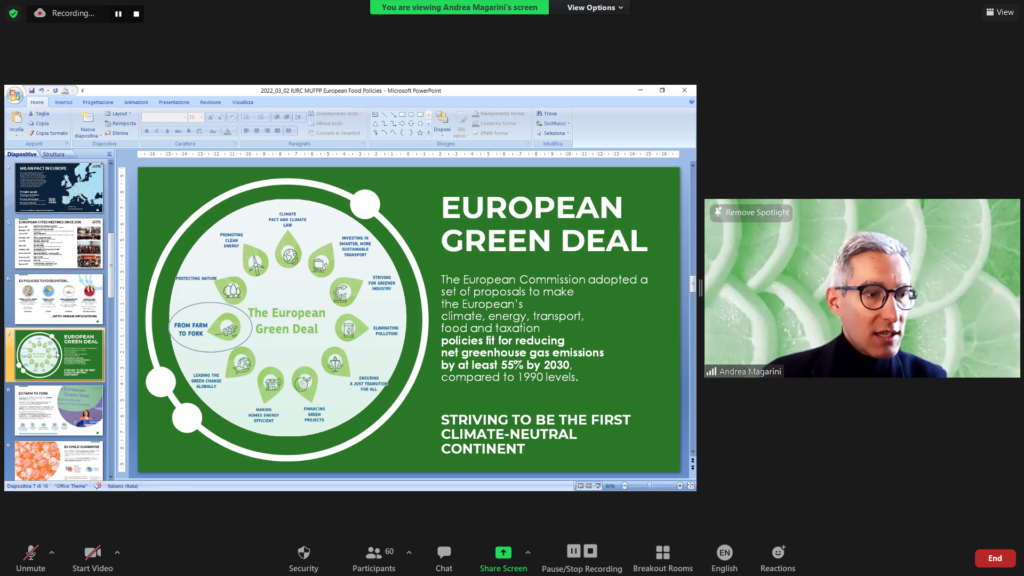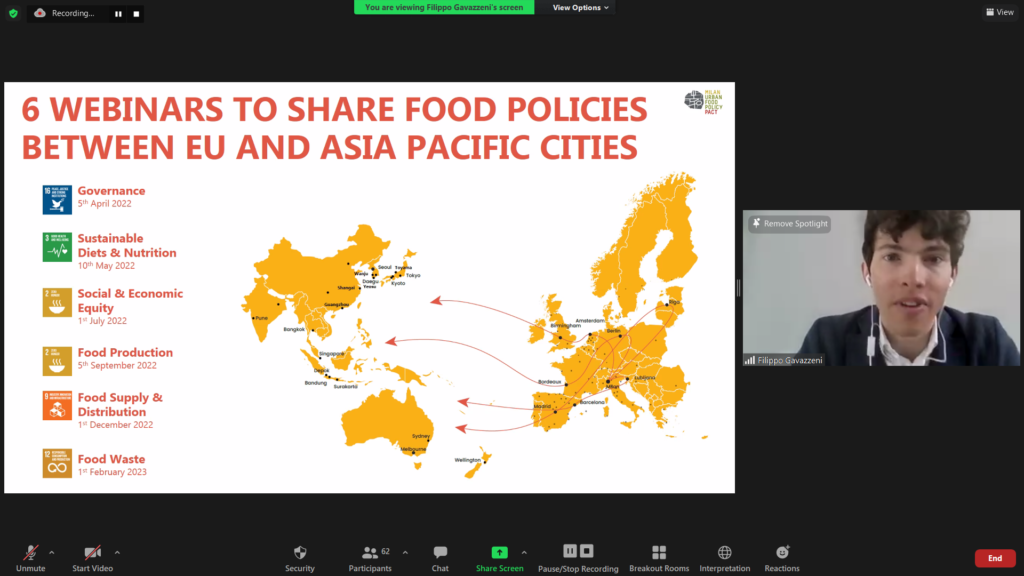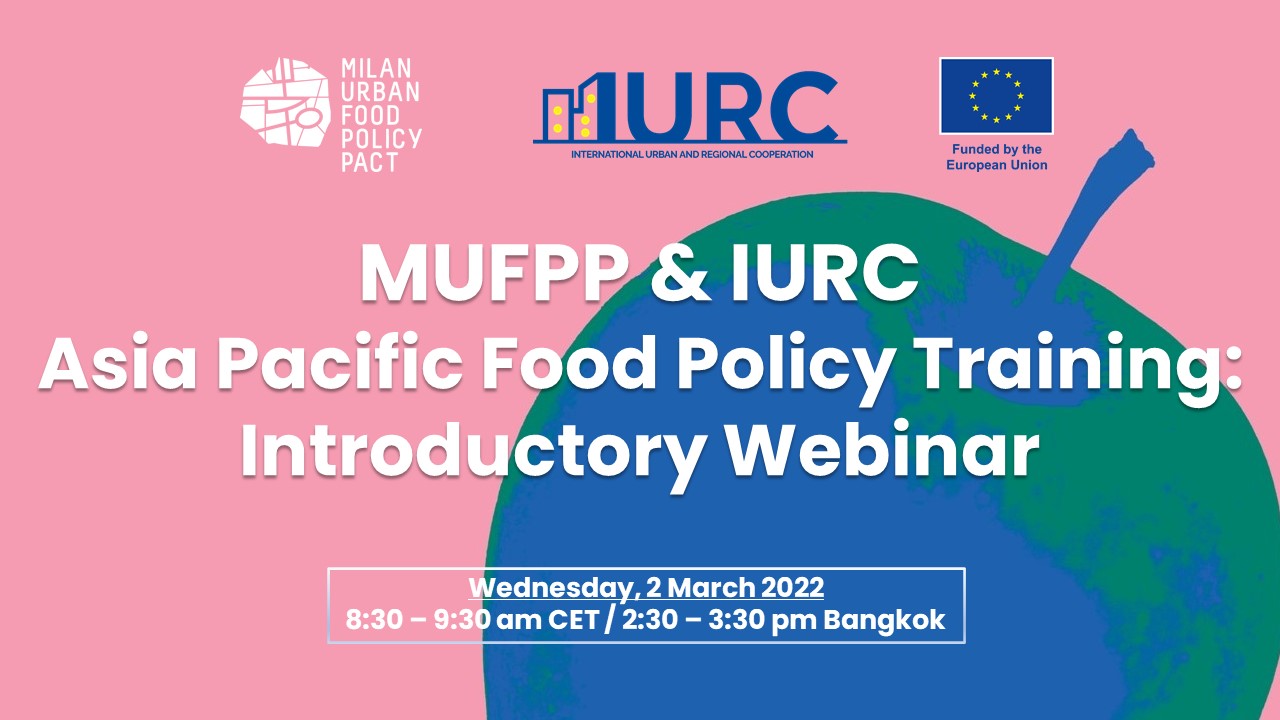The Milan Urban Food Policy Pact (MUFPP) and IURC teamed up to launch food policy training for Asia Pacific cities. The objective of the MUFPP & IURC Asia Pacific Food Policy Training is to offer participating cities the opportunity to showcase their best practices and learn from their peers in the region on food policy. This series of six webinars will take place throughout 2022 until early 2023, each focusing on a specific aspect of food policy and featuring practices implemented by cities in Europe, Milan, and Asia Pacific.

As an introductory session, the launch event on 2 March 2022 provided information on the work of both the MUFPP and IURC and stressed the importance of developing sustainable food systems. Moderated by Mr. Pablo Gándara, Team Leader of IURC Asia & Australasia, the event welcomed Mr. Michel Mouchiroud, Deputy Head, EU Foreign Policy Instruments Asia-Pacific, who highlighted how having fair, healthy, and environmentally friendly food systems could reduce greenhouse gas emissions and improve the management of natural resources as part of the European Green Deal. He was very keen to work with MUFPP and participating cities to promote urban food policies and find a way to make the food system more sustainable. As a final statement, he was looking forward to the upcoming webinar series that would inspire other cities. From the European Union’s perspective, he hoped the exchange would encourage the development of food policies in a more sustainable way.
Mr. Andrea Magarini, Chair of the Eurocities Working Group – Food, underlined the importance of a sustainable food system to transform the cities in the framework of the EU Green Deal. He briefly introduced the Eurocities Working Group Food as a creative hub for sharing information, ideas, best practices, and experimenting with innovative solutions related to urban food among European cities. Further, he summarized the EU strategies on the food system where European cities were playing a big role. Some resources, e.g. tools, guidelines, recommendations, approaches, were developed under the strategies and would be shared during the upcoming webinar series.

- EU Farm to Fork: As the center of the European Green Deal, this strategy has the intention to make the food system fair, healthy, and environmentally friendly. Within this strategy, some initiatives are set with agriculture food production as key tools.
- EU Child Guarantee: Launched last year, the strategy aims to fight against food poverty in childhood. It pays attention to the school canteens, where they are managed by the local authorities. The strategy sets two main goals: to provide at least one healthy meal each school day, and the second is to ensure a continued system to promote healthy nutrition.
- EU platform for food losses and waste: It is designed to reduce food losses along the food production and supply chain, maximizing the contribution from all key players. The platform brings together all relevant stakeholders from farmers, processors, manufacturers, retailers, and consumers to find concrete solutions. Some valuable documents are produced under the platform; among them are EU guidelines for food donation, analysis on EU food redistribution policies and practices, food waste assessment, and food waste prevention recommendation for actions.
- Food 2030: Launched in 2015, the strategy puts priorities in four different areas: 1) nutrition for sustainable and healthy diets, 2) food system supporting a healthy planet, 3) circularity and resource efficiency, and 4) innovation and empowering communities.
Mr. Magarini continued the presentation with the introduction of five different urban food projects funded by the European Union, engaging policymakers and researchers. They were 1) Food Trails, 2) Food Shift 2030, 3) Fusilli, 4) Cities 2030, and 5) FoodE. To close the presentation, he briefly introduced the Food Trails project, which aimed to translate the MUFPP’s shared vision and collective commitment to integrated urban food policies into measurable and long-term progress towards sustainable food systems in Europe.

The MUFPP was introduced by Mr. Filippo Gavazzeni, Head of the MUFPP Secretariat. Launched by Milan Municipality in 2015, the MUFPP is a global commitment of 222 mayors from around the world that considers food as an entry point for the sustainable development of growing cities. Within the MUFPP governance, the cities of Bandung and Seoul – both are IURC cities – have been elected as Steering Committee representatives for the Asia Pacific. The MUFPP’s main aim is to support cities wishing to develop more sustainable urban food systems by fostering city-to-city cooperation and exchange of best practices. Subsequently, Mr. Gavazzeni explained the structure of the webinar series, which covers the six categories of the MUFPP, namely (1) governance, (2) sustainable diets and nutrition, (3) social and economic equity, (4) food production, (5) food supply and distribution, (6) food waste. Within this exchange, the MUFPP and IURC would support cities to identify possible pilot projects or joint activities.
At the end of the session, the participating cities were suggested to complete an online survey, with such questions on the city’s food political commitment, good practices, and learning needs. The survey results would be used to facilitate the connections among cities with similar aspirations and learning needs.
The first webinar of the series on the topic of governance will be organized on 5 April 2022.
